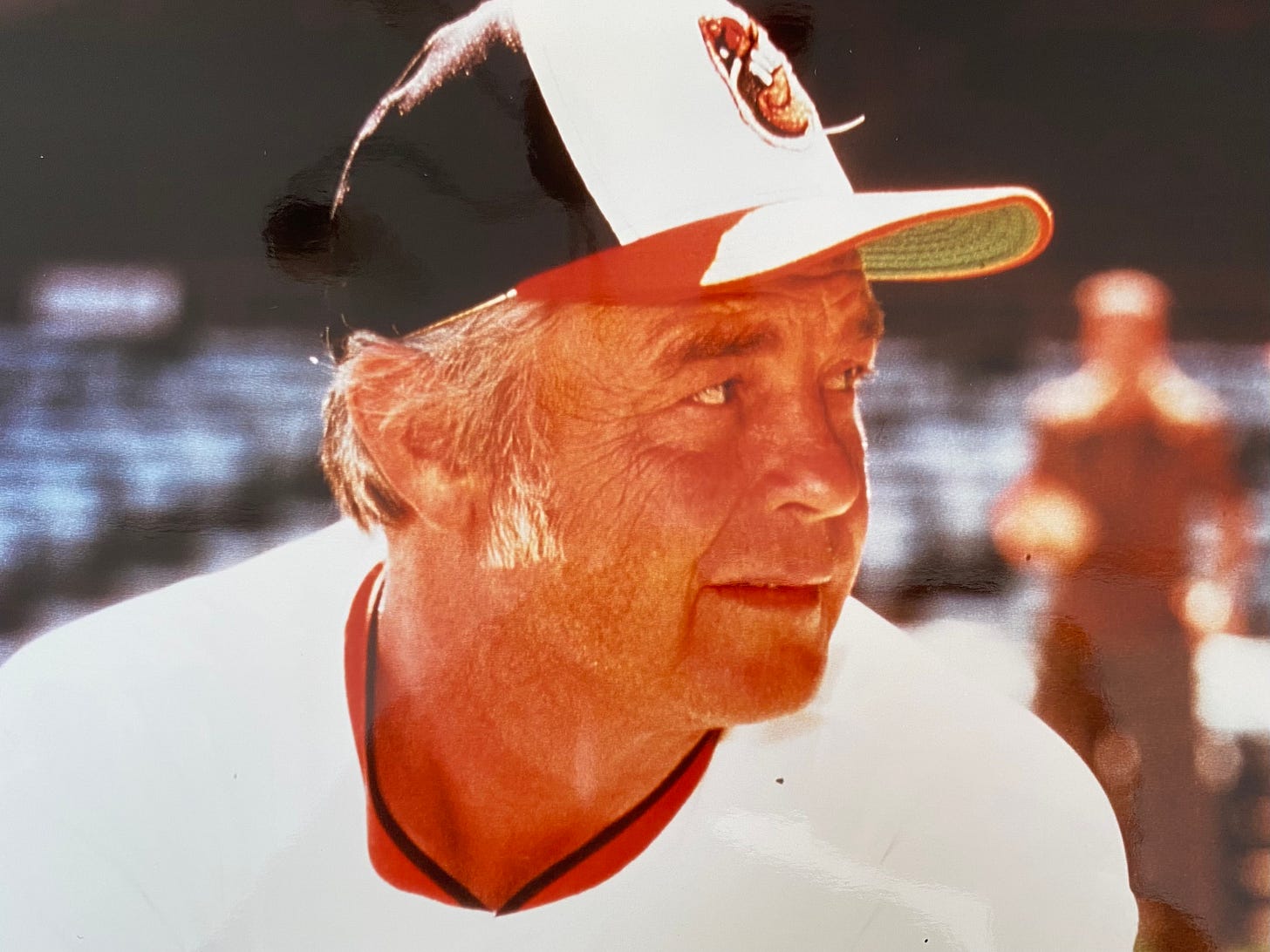The Bird Tapes Interview: Earl Weaver
Before I spoke to him in the fall of 1999 for my book about the history of the Orioles, he asked me a question that surprised me. Our conversation veered in many directions from there.
I knocked on Earl Weaver’s front door on a gray morning in South Florida in the fall of 1999. He wasn’t exactly kicking his heels when he opened the door,
“Oh, yeah,” he said in the flat voice you use when, say, you’re reminded that you have a dental appointment that day.
We had spoken on the phone several weeks earlier, setting up the date and time for an interview. I had explained that I was writing a comprehensive book about the history of the Orioles and trying to interview all the major figures. He had said he’d give me some time, which I appreciated, but I could tell he was lukewarm. As I flew from Baltimore to South Florida, I fretted about how things would go.
It probably would’ve helped if we’d shared a wellspring of experiences, years and years of days and nights at the ballpark. Weaver had developed relationships with many of the reporters covering the Orioles, seemingly understanding the necessity of the media and even enjoying the give and take. Though occasionally combative, he was mostly just blunt, emotional, unpredictable and endlessly interesting.
But I was a high school and college student (in Texas and Pennsylvania) and then just starting my journalism career (in Texas) when he was in his glory as the Orioles’ manager from 1968 through his retirement in 1982. I had joined the Baltimore Sun by the time he made his ballyhooed return to the club in 1985, but that return didn’t go well or last long and he pretty much disappeared from the scene after that. I had occasionally called him for a comment and wrote columns about his Hall of Fame induction in 1996, so we knew each other. But that was the extent of it.
“How much are you paying me to do this?” he asked as we drove to eat breakfast at his golf club with his wife, Marianna, in the passenger seat and me in the back.
“Earl,” I said, “I’m not paying you a dime.’
That’s a journalism 101 thing, for those who don’t know. No money involved. Earl knew it and surely wasn't expecting any payment, but I guess he figured he’d ask anyway. Maybe he was just testing me. When I told him no, he made a chortling noise, a kind of laugh, as he drove on.
After we settled in for breakfast at his club, I put my microcassette recorder in front of him and turned it on. I could have talked to him for hours. He had started with the Orioles as a minor league manager in 1957, worked his way through the ranks, and managed the major league club to four World Series appearances. Now, he was almost 70, a Hall of Famer with enough Orioles memories and insights to fill his own book if he chose to write one.
But I wasn’t going to have him for hours. He told me he had a late-morning tee time. He was fitting me in.
My job, as the interviewer, was to loosen him up quickly and get him going on as many subjects as possible before his tee time beckoned. Listening to our conversation a quarter-century later, I can certainly say that I tried.
We spoke over breakfast. Then he drove us back to his house — tape recorder still running. Then we sat in his den and spoke until it was time for him to play golf.
Weaver did get going on many subjects, starting with his background in St. Louis, how he got into managing and his part in developing “the Oriole Way” at the team’s minor league camp in Thomasville, Georgia. He gave his thoughts on why Hank Bauer, the manager who preceded him, was fired. He hinted at his sheer brilliance when he explained why he began using matchup data — how certain hitters hit certain pitchers — to set his lineup long before the rest of baseball fell in love with such “analytics.” He suggested the Orioles blew a golden opportunity by not signing Reggie Jackson to a longterm contract after he played for them in 1976.
There is much, much more.
The interview is posted below, divided into two parts. It’s the third of my Bird Tapes interviews to go live, following Brooks Robinson and Ernie Harwell, and many more are coming, including interviews with Frank Robinson, Boog Powell, Paul Blair and Cal Ripken Jr. in the near future. The interviews are premium Bird Tapes content, for paid subscribers. (New subscribers receive a one-week free trial, enabling them to sample the archive.) Please subscribe if you’re interested in exploring the history of the Orioles in this one-of-a-kind format.
Keep reading with a 7-day free trial
Subscribe to The Bird Tapes to keep reading this post and get 7 days of free access to the full post archives.





